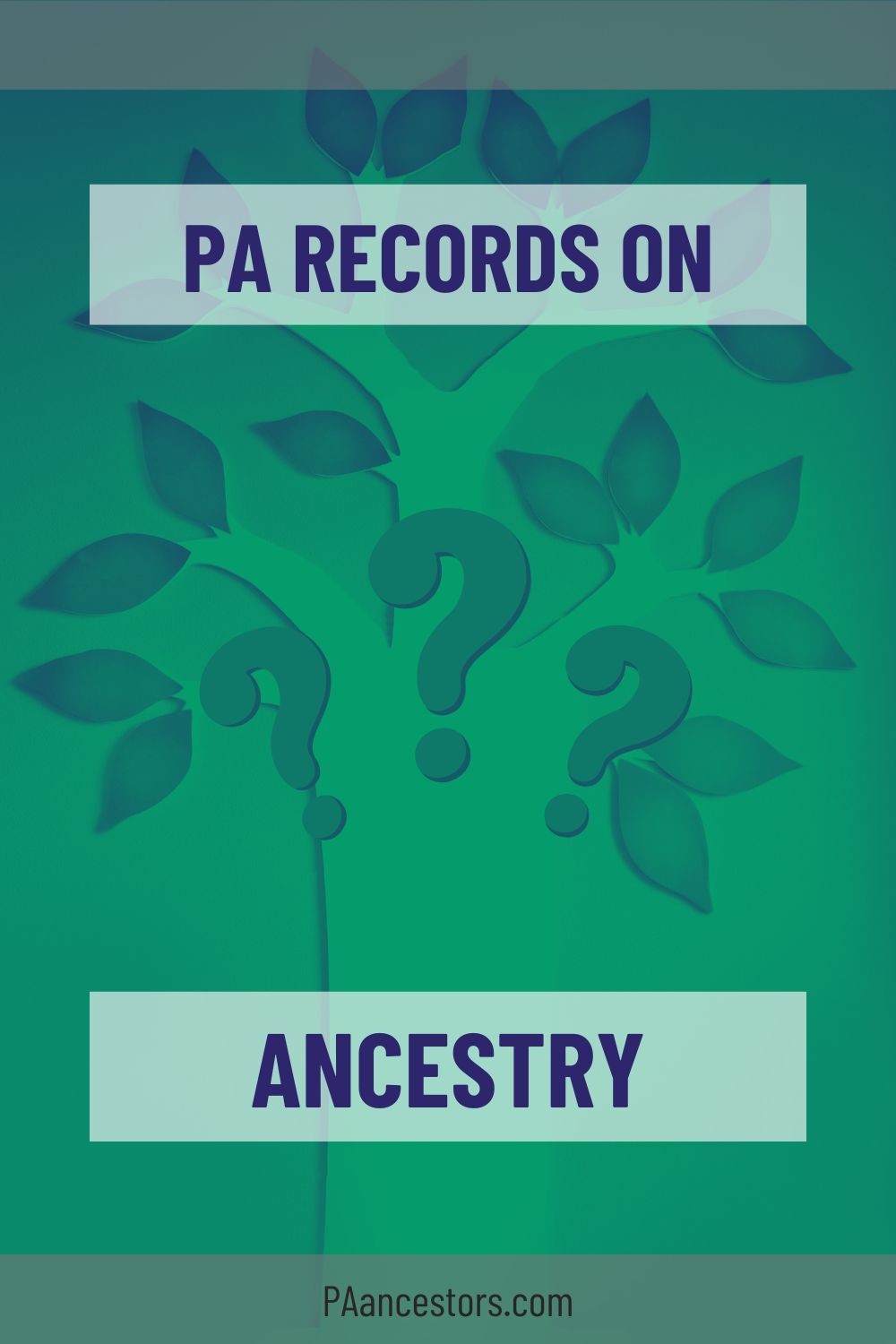Pennsylvania Genealogy Made Easy: Tips for Ancestry.com Research Success
If you are researching your Pennsylvania ancestors, you might be wondering how best to use Ancestry. I'll share some benefits of using Ancestry, tips and tricks to help you search on Ancestry, and their most-popular databases for online Pennsylvania genealogy research.

Ancestry is one of the largest genealogy websites in the world.
If you are researching your Pennsylvania ancestors, you might be wondering how best to use Ancestry (also known as Ancestry.com). The website definitely has some useful Pennsylvania genealogy resources you'll want to use to start or further your family history research.
In this article, I'll share some benefits of using Ancestry, tips and tricks to help you search on Ancestry, and their most-popular databases for online Pennsylvania genealogy research.
So whether you're a beginner or an experienced genealogist, this guide will provide you with the tools and resources you need to uncover your Pennsylvania family history.
Ancestry Overview and Benefits
Ancestry is one of most popular genealogy websites in the world. With over 40 billion records and a vast collection of historical documents, Ancestry is an excellent resource for anyone looking to research their family history. One of the biggest advantages of using Ancestry.com is its ease of use. The site is user-friendly, with a simple interface that makes it easy to navigate through the various collections and databases.
Another significant benefit of Ancestry is its extensive range of records relating to Pennsylvania genealogy. The site has a vast collection of Pennsylvania-specific records, including birth, marriage, and death certificates, census records, military records, and more. With so many records available, you can easily trace your Pennsylvania family history back several generations just on Ancestry.
But Ancestry is not just a database of records. The site also provides access to a range of tools and resources that can help you make the most of your research. For example, the Ancestry message service allows you to connect with researchers working on the family trees like yours. Additionally, the site's DNA testing service can help you connect with living relatives and uncover new branches of your family tree.
Tips for Effective Search and Navigation on Ancestry
While Ancestryis a powerful tool for genealogical research, it can be overwhelming for beginners. Here are some tips to help you make the most of your search and navigate the site with ease:
1. Start with a solid research plan
Before you start your search on Ancestry, it's essential to have a solid research plan in place. This plan should include a clear idea of what you're looking for, including the names, dates, and locations of your ancestors. It's also a good idea to create a list of potential sources, such as census records or marriage certificates, that you will need to access to complete your research.
2. Use advanced search techniques
Ancestry has a powerful search engine that can help you find the records you need quickly. However, to get the best results, it's essential to use advanced search techniques. These techniques can include using wildcards, searching by location, or using filters to narrow your results. By using these techniques, you can save time and find the records you need more efficiently.
3. Explore the site's collections and databases
Ancestry has a vast collection of records and databases that can help you trace your Pennsylvania family history. To make the most of these resources, it's important to explore the site's collections and databases fully. Take the time to familiarize yourself with all the available resources for Pennsylvania. Go to the 'Search' menu, then choose 'Catalog.' You can narrow your choice to just Pennsylvania from there.

Utilizing Ancestry's Collections and Databases for Pennsylvania Research
Ancestry has a wealth of resources available for Pennsylvania genealogy research. Here are some of the most popular and useful collections available on the site:
1. Pennsylvania, Death Certificates, 1906-1969
What's unique about this collection at Ancestry is the death certificates are full-color digital images, not the usual digitized microfilm. You’ll be able to see every ink color, stray mark, and even notes in the margins and on the back. (Don’t forget to go to the next image!) Pennsylvania’s Death Certificates are public record up until 1970 as of January 1, 2021, so if you need an ancestor’s record between what Ancestry has indexed on the site and December 31, 1972, but sure to contact the PA State Archive for a copy of the original.
2. Pennsylvania, Birth Certificates, 1906-1911
Like the death certificates, Pennsylvania’s early birth certificates are also publicly available in full-color digital images. To protect living people’s identities, publicly available records are available until 1915. Be sure to look for all the children of a couple because those birth certificates for children who died young might have the information you’ve been seeking. Infant mortality prior to 1920 was about 225 deaths per 1,000 births, compared to 7 deaths per 1,000 births in 2020. Pennsylvania’s Birth Certificates are public record up until 1915 as of January 1, 2021, so if you need an ancestor’s record between what Ancestry has on the site and December 31, 1917, but sure to contact the PA State Archive for a copy of the original.
3. Pennsylvania, Church and Town Records, 1708-1985
This database contains over 7 million records of births, marriages, and deaths from churches and towns in Pennsylvania. The records include information such as the individual's name, date of event, and location. This database is an excellent resource for anyone looking to trace their Pennsylvania family history back to the colonial era. The collection of church records comes from the Historical Society of Pennsylvania‘s books which were collected by the Genealogical Society of Pennsylvania many decades ago. It is a very small sample of the available church records created over Pennsylvania’s history. For a more thorough search, contact the county historical or genealogical society your ancestor lived in for their collected church records.
4. Pennsylvania Marriages, 1852-1968
While not every ancestor marries, most did, and this database of marriages from county courthouses is a helpful place to start. Unfortunately not every marriage has the original document attached to the index. You’ll want to contact the county courthouse for a copy of the marriage license or check FamilySearch.org under marriage record collection. You’ll find out not only the minister or official who married the couple, but also the parents’ names, residence, birth places, and of course place and date of marriage.
Additional Online Resources for Pennsylvania Genealogy Research
While Ancestry is an excellent resource for Pennsylvania genealogy research, it's not the only one available. Here are some additional online resources that can help you with your research:
1. Pennsylvania State Archives
The Pennsylvania State Archives is a valuable resource for anyone looking to trace their Pennsylvania family history. The archives contain a vast collection of Pennsylvania-specific records, including tax records, military records, and more. The archives also provide access to digital images and research guides to help you with your research. To learn more about the PA State Archives, listen to Podcast Episode 1: Pennsylvania State Archives and Podcast Episode 60: All About PA Military Records with Aaron McWilliams.
2. State Library of Pennsylvania
The State Library of Pennsylvania is another excellent resource for Pennsylvania genealogy research. The State Library provides access to a range of historical resources, including maps, photographs, and online newspaper online for free at Power Library. To learn more about the State Library of Pennsylvania, listen to Podcast Episode 3: State Library of Pennsylvania.
3. Genealogical Society of Pennsylvania
The society based in Philadelphia provides access to a range of resources, including databases, research guides, and publications. The society also offers educational programs to help genealogists of all levels improve their skills.
4. Western Pennsylvania Genealogical Society
The Western Pennsylvania Genealogical Society, WPGS, focuses on the 26 counties in the western part of PA. Their excellent newsletter and website can help both beginning and advanced researchers in their family history research. They also have a research library available for free at the Carnegie Library in Pittsburgh. To learn more about WPGS, listen to Podcast Episode 5: Western Pennsylvania Genealogical Society.

Conducting Genealogy Research in Pennsylvania
While online resources are a valuable tool for Pennsylvania genealogy research, there are also many opportunities for conducting offline research in the state. Here are some tips for conducting offline research in Pennsylvania:
1. Visit local historical societies and archives
Many local historical societies and archives in Pennsylvania have collections of historical documents and records that can be invaluable for genealogy research. It's a good idea to visit these libraries and archives in person to access these resources and get help from local experts.
2. Contact local genealogical societies
Pennsylvania has a vibrant genealogy community, with many local events and workshops taking place throughout the year. Most Pennsylvania genealogical societies also have a Facebook page so they are easy to reach. These groups provide opportunities for networking with other genealogists doing research on the same family lines and learning about local genealogy records.
3. Explore historic sites and museums
Pennsylvania is home to many historic sites and museums, which can provide valuable insights into the state's history and culture. Visiting these sites can help you better understand your Pennsylvania ancestors and the world they lived in. To see the state-sponsored museums, visit the Pennsylvania Historical and Museum Commission.
Organizing your research and keeping track of findings
Once you start your Pennsylvania genealogy research, it's essential to keep track of your findings and organize your research effectively. Here are some tips for organizing your research:
1. Create a research log
A research log is a valuable tool for keeping track of your research progress and organizing your findings. A research log can include information such as the sources you've consulted, the records you've found, and the research techniques you've used. By keeping a research log, you can stay organized and avoid duplicating your efforts.
2. Use online tools to organize your research
There are many online tools available that can help you organize your Pennsylvania genealogy research. These tools can include family tree software, research management tools, and collaboration platforms. By using these tools, you can keep track of your research progress and work more efficiently.
3. Share your findings with others
Sharing your findings with other genealogists and family members can be an excellent way to get feedback, collaborate on research, and discover new branches of your family tree. Social media platforms, genealogy forums, and family history websites are all great places to share your findings and connect with others.
Conclusion and Next Steps for Success in Pennsylvania Genealogy Research
In conclusion, Pennsylvania genealogy research can be a challenging. With the help of Ancestry and other online and offline resources, you can easily trace your Pennsylvania family history back several generations and uncover the stories of your ancestors.
© 2019–2023 PA Ancestors L.L.C. and Denys Allen. All Rights Reserved.
